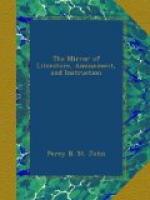’Tis told us that in dead of night,
(In days of yore long past)
A skiff was seen compact and light,
With sail, and oars, and mast.
And in it sat the spectral form,
Of a most beauteous maid;
Who heeded neither wind nor storm,
As she this voyage made.
Nor heeded she the pelting rain,
Nor winter’s blinding
snows;
But to the destin’d spot amain,
The scudding vessel goes;
Or if so calm, the placid Wye,
No wave was on its face,
Yet onward did that light bark fly
To reach the fated place.
When on the deck she was espied,
Each trembled to behold;
As on she sail’d ’gainst wind
and tide,
(’Tis scarce believ’d
when told)
Then sail and oar were both applied,
And swift the vessel flew;
But where the man—who could
abide
That vessel to pursue?
Ah! who could dare approach the spot
Where Isabel did steer?
That mariner existeth not,
But did that phantom fear.
Or where’s the man whose courage
bold,
Could lend him strength one
hour,
To gaze upon that form so cold,
Or place him in her power.
And when the spectral sail was spread,
That flutter’d to and
fro;
The hair would bristle on each head,
Which awful fear did show.
And when the moon-beam seem’d to
kiss,
That dreaded maiden’s
brow;
Something each knew would go amiss,
Nor judg’d such wrong,
I trow.
For tho’ the form was wond’rous
fair,
’Twas terrible to view;
And to avoid it was the care
Of every vessel’s crew.
Full many a dismal tale was told,
Of that fam’d spectre
ship;
And none were ever known so bold
To watch this nightly trip.
Why did that troubled shade proceed
Along that watery way?
Or what the purpose, or the deed,
Which caus’d her thus
to stray?
For good, or bad, did Isabel,
Forsake her dreary grave?
Or was’t because she lov’d
to sail
On Wye’s pellucid wave?
The spectre came to meet her dear,
Lord Hugh—the young
and brave;
When dreadful tidings met her ear,
“He’d found a
traitor’s grave.”
When second Edward rul’d this land,
(A wretched prince was he,)
Of favourites he’d a numerous band,
As worthless as could be.
Two noblemen amongst this set
Were hated above all;
And many were the lords who met,
To work the Spencer’s
fall.
Success attends these foe-men’s
strife,
Lord Hugh is doom’d
to die;
And in his happiest hours of life,
That precious life did fly.
His manly form did never more,
Bless Isabel’s fond
eyes;
With him—the joys of life were
o’er,
For him—the maiden
dies.
Yet still the spirit fondly clings,
To what in life has been,
Thus Isabel, it nightly brings
To this beloved scene.




